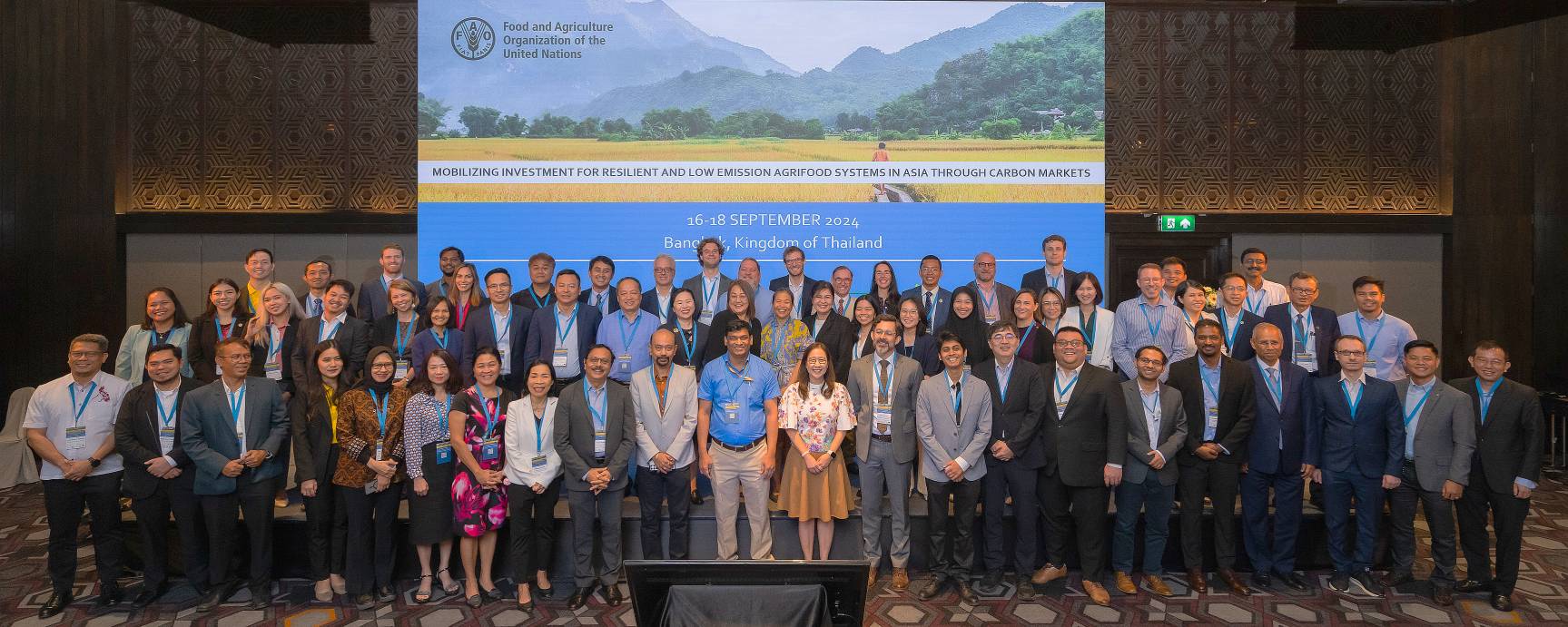Mobilizing investment for resilient and low-emission agrifood systems in Asia through carbon markets

Key Takeaways:
- The workshop explored how carbon markets could drive investments in low-emission rice cultivation and create opportunities for smallholder farmers in Southeast Asia.
- Transparent and standardized MRV guidelines are essential for verifying emission reductions and enabling smallholder participation in carbon markets.
- The high cost of MRV remains a barrier, with innovative solutions like small-scale concessional loans suggested to support farmers' participation in climate-smart practices.
Bangkok, Thailand (24 September 2024)—A three-day regional workshop concluded on 18 September 2024 in Bangkok, Thailand. Participants, primarily from Southeast Asia, convened to explore the potential of carbon markets in driving investments for low-emission agrifood systems.
The workshop was organized by the Food and Agriculture Organization of the United Nations (FAO) in partnership with the Institute for Global Environmental Strategies (IGES) and the International Rice Research Institute (IRRI) with additional development representatives such as the World Bank, United Nations Framework Convention on Climate Change (UNFCCC), as well as INGOs and consultancy organizations, such as the Global Green Growth Institute (GGGI), the Klik Foundation, RIZE, and individual ministries in the fields of agriculture and rice cultivation.
The International Rice Research Institute (IRRI) was represented through Katherine Nelson - Climate Change Scientist of IRRI Viet Nam Office, Bjoern Ole Sander - Representative to Thailand and Senior Scientist Lead at IRRI Thailand Office, and Amber Sharick - Sustainable Finance Officer of IRRI Viet Nam office to contribute in technical discussions on and off stage.

Katherine Nelson, Climate Change Scientist of IRRI Viet Nam speaking on the topic of ‘Emerging carbon market opportunities for resilient, low emission agrifood systems’
The workshop was held in the wake of the COP 28 climate summit, in which food systems were acknowledged as a component of addressing climate change and the target of limiting global warming to 1.5 degrees Celsius. Article 6 of the Paris Agreement, a mechanism for voluntary cooperation among countries, was discussed as a promising avenue to attract investment and encourage emissions reductions. The event featured a range of sessions, including awareness and knowledge sharing by development organizations in agriculture and rice cultivation.
Monitoring, Reporting, and Verification (MRV) methods were introduced to the audience by Regrow, Boomitra, and CarbonFarm. The Good Rice Alliance in India highlighted implementing GHG emission reductions in collaboration with technical assistance from IRRI in collecting data and operating and maintaining the equipment. IRRI contributed its insights, in particular on MRV.
Indeed, MRV received much attention as an enabler and requirement for Article 6, as well as the challenges it brings about. On the one hand, standardized methodologies, quantified emission reduction rates, and easy-to-understand guidelines were highlighted as indispensable to move in the right direction. “There is a need for standardizing the approach to quantifying emissions and ensuring that we don’t overcomplicate the requirements before projects have managed to prove economic feasibility,” Katherine Nelse pointed out.
The sentiment for coherent methodologies and whether those reach the implementing farmers on the ground was taken up at a subsequent discussion by Bjoern Ole Sander, “MRV requires rigorous procedures to follow, but are the methodological guidelines provided?” He highlighted that guidelines are needed to ensure the accuracy and consistency of any collected and submitted data, which is supposed to result in verifiable information and subsequently qualify carbon market participation.

Bjoern Ole Sander, Representative to Thailand and Senior Scientist Lead at IRRI Thailand speaking on the topic ‘Tools and approaches to support carbon market project planning and MRV for resilient, low emission agrifood systems’
A question on the ownership of the emission reduction was raised as well. Do the emission reduction credits and rights to sell belong to the person implementing practices that resulted in the reduction or to the entity that invested in the training, project development, registration, and costs for MRV? There are important distinctions in the ‘right to own’ and ‘right to sell’ that haven’t been determined across each country in the region as of yet.
As a notably common concern among all participants, the associated cost with MRV still proves to be challenging to overcome. Expecting the consumer to pay appears unlikely, especially when there is little to no awareness of the emissions from rice, and consumers can’t eat emissions. Unloading the cost onto the rice farmers is not an option as they are already vulnerable to climate effects and market price fluctuations and have low marginal profits. Carbon market participation comes with high costs from the beginning, and determining who will bear these costs and how the risks of entering a market can be reduced were the main topics of the workshop.
RIZE presented a proposition to the audience on providing small-scale concessional loans to rice farmers. The low-interest rate repayment happens at the end of a harvesting cycle when profits have been generated, provided that GHG mitigation practices are applied.
Participants explored the potential of mechanisms to mobilize finance for climate-smart agriculture projects, enhance country readiness, and develop national roadmaps for participation. A core component to going forward with carbon credits in the rice sector will be to harmonize the information collection on farming practices as well as incentivizing low emission cultivation practices for smallholders.
The Regional Workshop on “Mobilizing investment for resilient and low-emission agrifood systems in Asia through carbon markets” was held from 16 to 18 September 202 in Bangkok, Thailand. Government focal points from Cambodia, India, Indonesia, the Philippines, Thailand, Viet Nam, and other countries attended, including representatives from Ministries of Agriculture, Environment, and national greenhouse gas (GHG) registries.
Partners included: the UNFCCC RCC for Asia-Pacific, EcoSecurities, Sustainable Rice Platform (SRP), World Business Council on Sustainable Development (WBCSD), ASEAN Climate Resilient Network (ASEAN-CRN), International Rice Research Institute (IRRI), World Bank, Food and Agriculture for Sustainable Transformation (FAST) Partnership, U.S. Agency for International Development (USAID), Article 6 partner countries, civil society organizations and private sector stakeholders.